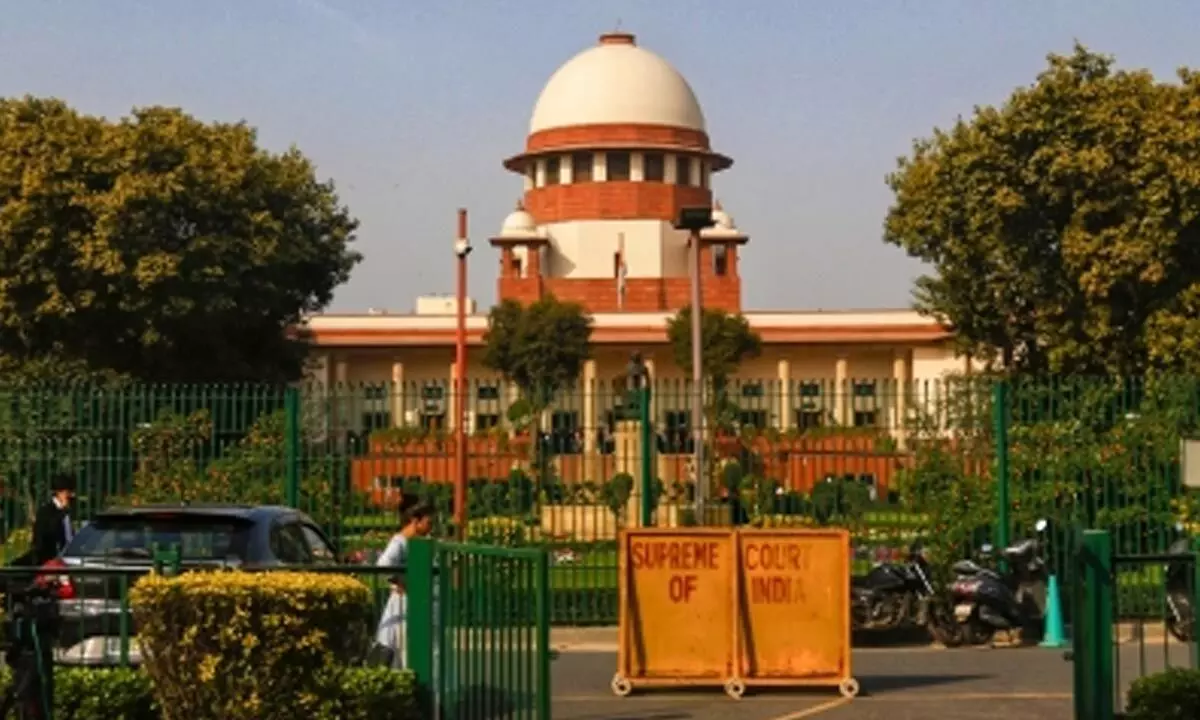Live
- GMR Airports Unveils AI-Powered Digital Twin Platform to Transform Airport Operations
- India poised to become leading maritime player: PM Modi
- Top Causes of Kidney Stones and How to Recognize Silent Symptoms
- India’s renewable energy capacity logs 14.2 pc growth at 213.7 GW
- Winter Session of Odisha Assembly adjourned sine die
- Biden calls Trump's tariff approach 'major mistake'
- After Drama Over Eknath Shinde’s Chief Minister Race, Maharashtra Cabinet Formation Faces New Tensions
- Egyptian FM, Blinken discuss recent developments in Syria
- Iran's supreme leader says Syria's developments result of US-Israeli 'plot'
- Elon Musk to Purchase $100 Million Luxury Mansion Next to Donald Trump's Mar-a-Lago, Report Reveals
Just In
Secured creditor can forfeit earnest money if there is a default in payment by auction-purchaser: SC

In a latest ruling, the Supreme Court has held that the Bank being a secured creditor can forfeit the earnest money of a successful auction-purchaser if the latter fails in depositing the balance amount within the timeline specified under the SARFAESI Rules.
New Delhi: In a latest ruling, the Supreme Court has held that the Bank being a secured creditor can forfeit the earnest money of a successful auction-purchaser if the latter fails in depositing the balance amount within the timeline specified under the SARFAESI Rules.
A bench presided over by CJI DY Chandrachud and comprising Justices JB Pardiwala and Manoj Misra said that any dilution of the forfeiture provided under Rule 9(5) would result in the entire auction process under the SARFAESI Act being set at naught by mischievous auction purchaser(s) through sham bids, and thereby undermining the overall objective of the law of promoting financial stability, reducing NPAs and fostering a more efficient and streamlined mechanism for recovery of bad debts.
The bench said that the consequence of forfeiture of 25% of the deposit under Rule 9(5) of the SARFAESI Rules is a legal consequence that has been statutorily provided in the event of default in payment of the balance amount and SARFAESI Act and Rules made thereunder must be interpreted keeping in mind the economic object which is sought to be achieved by the legislature.
Rule 9(5) of the SARFAESI Rules provides for forfeiture of the 25% earnest money deposit of the auction purchaser if there is a default in payment of the balance 75% of the amount after the sale has been confirmed by the secured creditor.
In the instance case, the sale confirmation letter issued by the Bank clearly stipulated that in the event of default in payment of the balance amount by auction-purchaser, the sale shall be liable to be cancelled and the earnest money would be forfeited. Yet, the appellant-bank gave a three-month extension for the payment of the balance amount on the ground that auction-purchaser term-loan was under-process.
However, due to failure of the auction-purchaser in remitting the balance amount within the stipulated time, the sale was cancelled and the amount already deposited was forfeited by the Bank.
In its impugned order, the Madras High Court took the view that the forfeiture of an amount or deposit by a secured creditor under the SARFAESI Rules cannot be more than the loss or damage suffered by it and the forfeiture of the entire earnest money deposit by the Bank amounts to unjust enrichment which is not permissible.
Aggrieved with the decision given by the High Court, the Bank preferred appeal before the Supreme Court.
In its decision, the Supreme Court said that interpretation given by the High Court would allow unscrupulous borrowers being hands-in-glove with the auction purchasers to use subversive methods to participate in an auction only to not pay the balance amount at the very end and escape relatively unscathed, thereby gaming the entire auction process and leaving any possibility of recoveries under the SARFAESI Act at naught.
“Thus, such an interpretation would completely defeat the very purpose and object of the SARFAESI Act and would reduce the measures provided under Section 13 of the SARFAESI Act to a farce and thereby undermine the country’s economic interest,” it said.
Ultimately, the apex court said that it is left with no other option but to set aside the “egregious” order passed by the High Court.

© 2024 Hyderabad Media House Limited/The Hans India. All rights reserved. Powered by hocalwire.com






